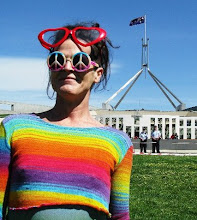Hundreds on Hunger Strike in Immigration Detention
this story was embargoed until published by the South Sydney Herald yesterday. Yes, the big lass called me up and spoke with me while I trembled and tried to keep the shaking out my voice. But she is just a mouthpiece for hypocrisy, and I am speaking the truth for the freedom that is the birthright of all God's children (or, secularly, of all human beings).
Hundreds on Hunger Strike in Immigration Detention
by norrie mAy-welby
Over a hundred people locked up in Villawood Immigration Detention Centre were on a hunger strike in November. Most of them are Chinese people seeking asylum from the persecution of their gentle faith, Falung Gong, perpetrated by their government in China. Other people from India and Vietnam joined the hunger strike, in protest against the poor and punitive conditions they are being held prisoner in, and against the length of detention for people, some who have been locked up for over four years, all separated from their families.
All but two people stopped the hunger strike after forty eight hours, after accepting reassurances from the Department of Immigration and Multicultural Affairs that their concerns would be properly addressed. The Minister for this department, Senator Amanda Vanstone, told the South Sydney Herald that the “protestors” hunger strike was “blackmail”, noting the timing of the protest coincided with a previously arranged visit to Villawood by the Human Right and Equal Opportunities Commission.
One of the people in the hunger strike, a Chinese Falung Gong practitioner, told the South Sydney Herald many of the Chinese people have been locked up for over a year in Australian immigration detention. In his case, which is typical of many, this followed his escape from detention and torture by the Chinese government. After they broke his hand in “interrogation”, he was taken to hospital, where he escaped through a window, and kept running.
He said the Chinese detained in Villawood were acutely aware of the group of 67 Chinese refugees previously detained in Villawood, who in May 2005 were interrogated in isolation for sixteen days by Chinese government officials invited in by Australian Immigration officials. This serious breach of those refugees’ privacy caused such endangerment to their safety that the Australian government was forced to admit that its actions had put them genuinely in fear of their lives if returned to China, and it had to grant them asylum.
Conditions for people held prisoner in the privately run Villawood Immigration Detention Centre are lamented as deplorable. Many people have told the South Sydney Herald of being detained for working without permission, and then being made to work in the detention centre at a rate of a dollar an hour, to buy phone cards, or cigarettes. They also report that the food is still awful, poor in nutrition, taste, and variety, despite years of complaints. They also report than almost all of the people in detention are being dosed with psychiatric medication.
When The South Sydney Herald spoke with Senator Vanstone and told her that of the considerable number of people in detention it has spoken directly with, almost all report being dosed with psychiatric medication, she said “No one was forced to take this. It’s an anonymous allegation about no particular person.” When asked if she would agree there was a systemic problem if over 90% of people in detention were on psychiatric medication, she said she would not comment on a hypothetical.
Senator Vanstone explained that people in detention are now given “points” to buy phone cards and cigarettes without having to work for them. When asked about the situation before 1 November when people who wanted points to buy cigarettes or phonecards had to work at the dollar an hour rate, she pointed out that no one had been forced to work.
An ongoing inquiry on behalf of the Australian Council of Heads of Schools of Social Work into detention conditions in Australia was told by Professor Chris Goddard, director of the National Research Centre for the Prevention of Child Abuse at Monash University, that "detention centres generated universal mental ill-health never seen outside a psychiatric hospital". The co-convener of the inquiry, Professor Linda Briskman from Curtin University in Western Australia, said the inquiry had been told of at least 10 people who had died in detention since 1999.
Disclaimer: The writer is a consciously involved member of the human race, not a detached observer, and has been visiting and supporting people detained in Villawood since June 2005.
Hundreds on Hunger Strike in Immigration Detention
by norrie mAy-welby
Over a hundred people locked up in Villawood Immigration Detention Centre were on a hunger strike in November. Most of them are Chinese people seeking asylum from the persecution of their gentle faith, Falung Gong, perpetrated by their government in China. Other people from India and Vietnam joined the hunger strike, in protest against the poor and punitive conditions they are being held prisoner in, and against the length of detention for people, some who have been locked up for over four years, all separated from their families.
All but two people stopped the hunger strike after forty eight hours, after accepting reassurances from the Department of Immigration and Multicultural Affairs that their concerns would be properly addressed. The Minister for this department, Senator Amanda Vanstone, told the South Sydney Herald that the “protestors” hunger strike was “blackmail”, noting the timing of the protest coincided with a previously arranged visit to Villawood by the Human Right and Equal Opportunities Commission.
One of the people in the hunger strike, a Chinese Falung Gong practitioner, told the South Sydney Herald many of the Chinese people have been locked up for over a year in Australian immigration detention. In his case, which is typical of many, this followed his escape from detention and torture by the Chinese government. After they broke his hand in “interrogation”, he was taken to hospital, where he escaped through a window, and kept running.
He said the Chinese detained in Villawood were acutely aware of the group of 67 Chinese refugees previously detained in Villawood, who in May 2005 were interrogated in isolation for sixteen days by Chinese government officials invited in by Australian Immigration officials. This serious breach of those refugees’ privacy caused such endangerment to their safety that the Australian government was forced to admit that its actions had put them genuinely in fear of their lives if returned to China, and it had to grant them asylum.
Conditions for people held prisoner in the privately run Villawood Immigration Detention Centre are lamented as deplorable. Many people have told the South Sydney Herald of being detained for working without permission, and then being made to work in the detention centre at a rate of a dollar an hour, to buy phone cards, or cigarettes. They also report that the food is still awful, poor in nutrition, taste, and variety, despite years of complaints. They also report than almost all of the people in detention are being dosed with psychiatric medication.
When The South Sydney Herald spoke with Senator Vanstone and told her that of the considerable number of people in detention it has spoken directly with, almost all report being dosed with psychiatric medication, she said “No one was forced to take this. It’s an anonymous allegation about no particular person.” When asked if she would agree there was a systemic problem if over 90% of people in detention were on psychiatric medication, she said she would not comment on a hypothetical.
Senator Vanstone explained that people in detention are now given “points” to buy phone cards and cigarettes without having to work for them. When asked about the situation before 1 November when people who wanted points to buy cigarettes or phonecards had to work at the dollar an hour rate, she pointed out that no one had been forced to work.
An ongoing inquiry on behalf of the Australian Council of Heads of Schools of Social Work into detention conditions in Australia was told by Professor Chris Goddard, director of the National Research Centre for the Prevention of Child Abuse at Monash University, that "detention centres generated universal mental ill-health never seen outside a psychiatric hospital". The co-convener of the inquiry, Professor Linda Briskman from Curtin University in Western Australia, said the inquiry had been told of at least 10 people who had died in detention since 1999.
Disclaimer: The writer is a consciously involved member of the human race, not a detached observer, and has been visiting and supporting people detained in Villawood since June 2005.



0 Comments:
Post a Comment
<< Home